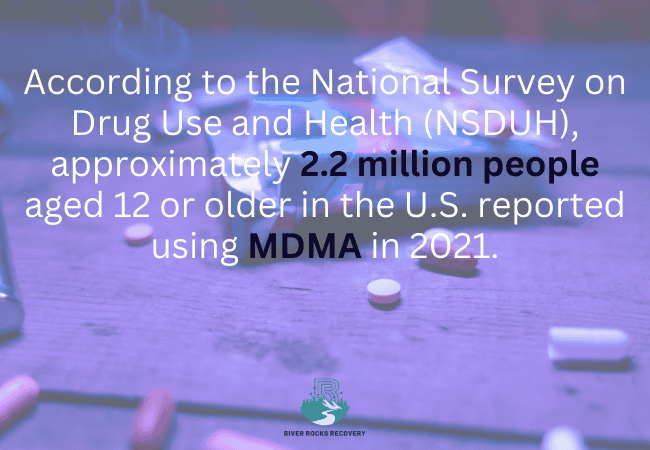Ecstasy, often known as MDMA or “Molly,” is a popular recreational drug that is commonly linked with nightclub, festival, and rave scenes. MDMA, which induces feelings of pleasure, emotional closeness, and sensory augmentation, appeals to persons looking for a stronger sense of connection and a momentary escape.
But its popularity raises an important question: is ecstasy addictive? What are the risks involved? Let’s jump into this blog and uncover the whole facts.
What is MDMA (Ecstasy)?
MDMA, methylenedioxymethamphetamine, is a synthetic substance that works as a stimulant and a psychedelic. MDMA was first manufactured in the early twentieth century, but it was not used recreationally until the 1970s.
When ingested, MDMA significantly increases the activity of three major neurotransmitters: serotonin, norepinephrine, and dopamine. Serotonin release improves mood and emotional intimacy, dopamine promotes bliss, and norepinephrine raises heart rate and blood pressure. These combined effects produce a feel-good sensation, making MDMA appealing to persons seeking to improve their mood and energy in social situations.
Is MDMA Addictive?
The addictive potential of MDMA is currently being disputed. It is not as physically addictive as opioids or alcohol, but some users report psychological addiction. The desire to relive the emotional highs of MDMA can lead to repeated use, and people may develop a psychological dependence over time.
MDMA’s effects on the brain’s reward center, notably the release of dopamine, might cause some users to crave the high and seek out the drug again. According to studies, while MDMA is less likely than other chemicals to cause compulsive drug-seeking behavior, it nevertheless has the potential for abuse, especially in social or routine circumstances.
Risks of Using MDMA
MDMA use is not without risks. While some consider it comparatively safe owing to the absence of severe physical addiction, the risks to mental and physical health are genuine and frequently underestimated. Here are some important risks related to MDMA:
Neurotoxicity: MDMA can harm serotonin-producing neurons, resulting in long-term mood disorders, memory issues, and cognitive deficiencies.
Hyperthermia: MDMA raises body temperature, particularly in crowded settings such as clubs. This may result in major organ failure or death.
Dehydration and Electrolyte Imbalance: When combined with dancing and high temperatures, MDMA usage can cause dehydration or hazardous electrolyte imbalances, putting strain on the heart and kidneys.
Comedown benefits: After the benefits of MDMA wear off, users frequently experience a comedown that includes depression, irritability, and weariness, which can linger for days. This can hurt mental health, especially if used frequently.
Polydrug Use: Many MDMA users mix it with other drugs such as alcohol, cocaine, or cannabis. This exacerbates the health hazards and can result in severe drug interactions.

Need Help from Professionals? Call River Rocks Recovery!
If you or someone you know struggles with MDMA usage, seeking addiction treatment center in Ohio is a critical step. We at River Rocks Recovery offer counseling, behavioral therapy, and support groups that are frequently used in the treatment of MDMA dependency to assist users build healthy coping methods and avoid future abuse. Embrace the comprehensive care offered at River Rocks Recovery, and contact us today at (888) 905-6281.




























